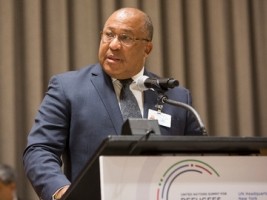|
||||||||||||||||||
|
|
Haiti - Politic : The Chancellor Délienne to the UN explains the Haitian migration 27/09/2016 10:48:10
In his speech the Chancellor Délienne explained the Haitian migration. Extract from the speech of the Chancellor Délienne : "[...] Mr. President, [...] In the early twentieth century a large number of Haitian peasants were expelled from their land. Curiously, at the same time, massive investments were made in the neighboring country of Haiti. A new international division of labor was therefore created in the region, according to which some countries would receive investments and others like Haiti had to provide labor. Since then, the fate of the Haitians was sealed. These first migration flows, which led Haitian farmers to Cuba and the Dominican Republic, were followed by other currents involving citizens belonging to other social strata who fled the dictatorship, political repression and lack of perspective of improving their living conditions. In recent years, the strategy adopted by some States, under the guise of family reunification, have implemented a 'selective immigration' policy depriving the country of the contribution of its scarce human resources capable of planning and accelerate the national development process, significantly worsened the situation. Today, the fragility of our economy, the lack of remunerative and productive employment as well as the reluctance of the solidarity of the international community have pushed Haiti towards the countries of Latin America in search of wellness. We are convinced that if they could find work at home they were not going anywhere except to satisfy their intellectual curiosity. Mr. President, The migratory problem and the explosion of refugee flows will not find an adequate solution if one does not try to resolve them at source and in duration. [...] If people can not live in peace at home, [...] if they can not find work in their own country and export their goods they will have no other choice that export themselves. Any lasting solution to the issue of international migration goes through [...] a more active and open solidarity between rich and poor. [...] The mobilization and orientation of resources for financing development must be done with a particular emphasis on the countries and regions of origin of flows of migrants, because the creation of wealth, of massive jobs have as primary purpose to maintain populations and human resources on their territory. In this, the Republic of Haiti, calls on international financial institutions to review their strategies and policies vis-à-vis of these countries, particularly countries considered as beneficiary of the many relief or debt rescheduling initiatives, including the initiative in favor of heavily indebted poor countries (HIPC). Concretely, we must find mechanisms to these countries in special situations to return to the international capital market in order to have the resources to their takeoff or development. It is only in this way that we will be able to succeed, if not to reduce migration issues, at least to mitigate the consequences [...] HL/ HaitiLibre
|
|
|
Why HaitiLibre ? |
Contact us |
Français
Copyright © 2010 - 2024 Haitilibre.com |



